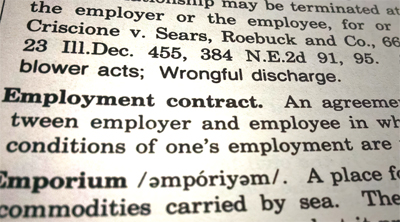 Former Massachusetts Governor Patrick made some headlines in early 2014 with the proposition of banning the enforceability of non-compete agreements in Massachusetts. It was one of his many ideas to help spur innovation in the Bay State by helping out newer technology-based companies. Like so many of his plans, the Governor did little to garner any meaningful support, but the concept still remains a worthwhile topic to discuss. This becomes all the more true where a state like California supporting Silicon Valley and other major tech centers has declined to hold non-competes to be enforceable.
Former Massachusetts Governor Patrick made some headlines in early 2014 with the proposition of banning the enforceability of non-compete agreements in Massachusetts. It was one of his many ideas to help spur innovation in the Bay State by helping out newer technology-based companies. Like so many of his plans, the Governor did little to garner any meaningful support, but the concept still remains a worthwhile topic to discuss. This becomes all the more true where a state like California supporting Silicon Valley and other major tech centers has declined to hold non-competes to be enforceable.
Making a Massachusetts Non-Compete Agreement Legally Enforceable
The courts in Massachusetts, like those in other states that recognize non-compete agreements, simply require that employers’ restrictions are not unreasonable. Like all “reasonability” tests in law, the devil is always in the details. This test strikes the balance of interest between employers, who want protection from unfair competiton versus individual employees, who must have the ability to work someplace in their field after leaving the employer in question. The inquiry on whether or not a non-compete agreement (a.k.a. restrictive covenant) is reasonable is a very fact-specific examination that relies primarily on three factors: geographic scope, duration, and type of work. If any one or all of these factors combined are too broad, the agreement should not be enforceable to that extent.
Can a Non-Compete Agreement be Held Invalid or Illegal?
While it is possible that a non-compete could be considered illegal in Massachusetts, e.g. where they concern illegal activities (e.g. prostitution, gambling or drugs), the courts would not find an agreement illegal due to overly restrictive work provisions. As described above, courts will look at whether the agreement was reasonable as to its terms. If the agreement is found to be unreasonable, the court will not invalidate the entire agreement, but simply limit those terms that are too unreasonable. Take the below scenario, borrowed from a seminal Massachusetts case on non-compete agreements as an example:
Upon joining as a salesman for Stainless, a manufacturer of stainless steel fasteners, Colby signed a non-compete agreement where, at any time after leaving Stainless, he would not work for a competitor for a period of two years in the New England/New York region. Colby’s sales territory at Stainless covered southern New Hampshire and Maine, and northern Massachusetts. Colby later left the company to work for a competitor. In a subsequent lawsuit, the Court found that while Colby’s restricted duration and type of work in Colby’s non-compete agreement with Stainless were reasonable, the geographic scope was too broad. In its decision, the Court therefore held the agreement to be enforceable only to the limits of Colby’s former sales territory.
Possible Exceptions to Non-Compete Agreements
 Even though apparently reasonable and valid, other circumstances of the employment might still prevent a non-compete from being enforced by a Massachusetts business. A consultation with a business attorney should help reveal the finder details of an employment agreement, but some standard questions to consider include:
Even though apparently reasonable and valid, other circumstances of the employment might still prevent a non-compete from being enforced by a Massachusetts business. A consultation with a business attorney should help reveal the finder details of an employment agreement, but some standard questions to consider include:
-
Did the Employee tell any Managers that he or she was leaving for a competitor?
If an employee was forthright with his or her superior on the intent to leave for employment with a competitor, it is possible that the employer would be prevented from enforcing its non-compete agreement with that employee. Ascertaining the timing, form and content of any such communication would be necessary to determine whether this is a viable defense.
-
Was the Employee promoted during his or her tenure with the employer?
If an employee undergoes a material change in employment (levels of responsibility, rates of pay, separate departments, changes in command), the content of an earlier non-compete agreement may be unenforceable against that employee. Again, the viability of this defense is very fact-based and needs to be weighed by an attorney familiar with small business employment.
-
Was any consideration furnished to the Employee as part of his or her signing the agreement?
Contract law predictably applies to all contracts, and non-compete agreements are not an exception to this inherent truth. A contract, at its most basic level, needs to demonstrate a bargained for exchange between parties. If no “consideration” is given on one side of the equation, the contract may be void. While an offer of employment is usually adequate consideration, many companies offer some additional compensation in exchange for the non-compete agreement, especially if the non-compete is entered into sometime after entering employment. For an employer, the cost of doing so is well worth the potential risk of expenses down the road.
- Was the Worker an Employee or an Independent Contractor?
While Massachusetts cases have not yet touched on the subject, other jurisdictions have determined that non-compete agreements may be held invalid if the employee was treated like an independent contractor. Given that Massachusetts has rather strict guidelines on the employee vs. independent contractor question, it seems that the potential non-compete issue presents yet another reason for employers to clarify the status of their employees.
Drafting the Massachusetts Non-Compete Agreement
In all contracts where there are clearly superior and inferior parties to the transaction, there is always a risk that the courts will pay special attention to their terms. At various times in history, contracts between financial institutions and consumers, prenuptial agreements between wealthy and less financially able spouses, and non-compete agreements have undergone an extra level of scrutiny. In all such situations it is therefore highly recommended to consult with an attorney to assist in being forthright, fair and reasonable in the drafting, negotiation and execution of these agreements. Call our office today for a consultation on employer or employee business side non-compete agreements in Massachusetts.




